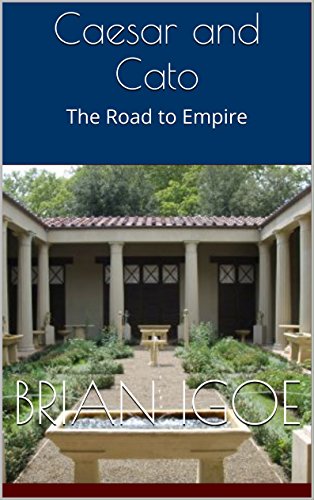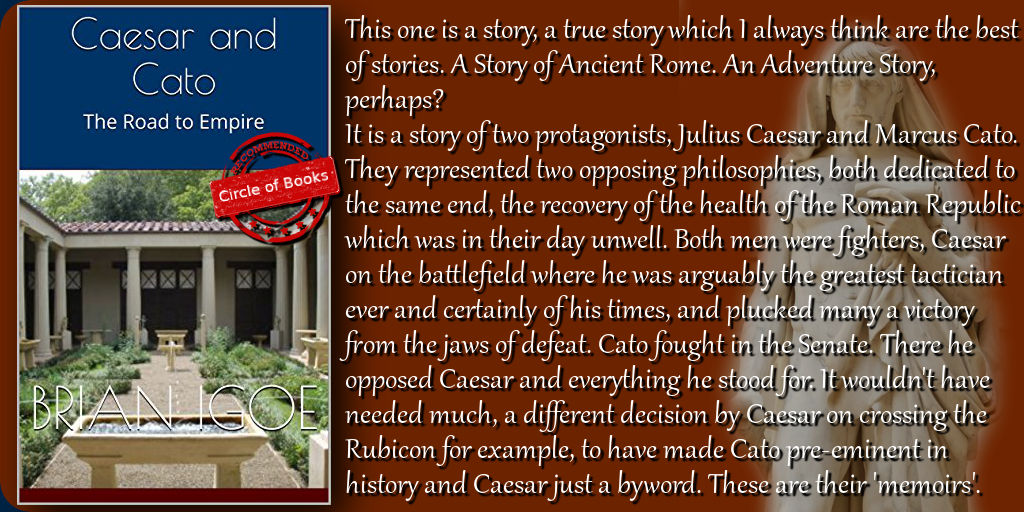Caesar and Cato: The Road to Empire is the first book of The Empire historical series by Brian Igoe.

Know More
This is the first book in The Empire series, books about various unusual Roman Emperors. The second book, Augustus, will be out later this year.
This one is a story, a true story which I always think are the best of stories. A Story of Ancient Rome. An Adventure Story, perhaps?
It is a story of two protagonists, Julius Caesar and Marcus Cato. They represented two opposing philosophies, both dedicated to the same end, the recovery of the health of the Roman Republic which was in their day unwell. Both men were fighters, Caesar on the battlefield where he was arguably the greatest tactician ever and certainly of his times, and plucked many a victory from the jaws of defeat. Cato fought in the Senate. There he opposed Caesar and everything he stood for. It wouldn’t have needed much, a different decision by Caesar on crossing the Rubicon for example, to have made Cato pre-eminent in history and Caesar just a byword. These are their ‘memoirs’. A sample chapter can be read on my website at http://www.caesarcato.org/extract1.html.
The book takes the form of alternating chapters written by each of the two protagonists. The action covers a wide geographical range, from North Africa in the south to England in the north, from the Atlantic Ocean in the west to Greece in the east.
A Word from the Author
 I would love to have been an historian, but in fact I read law. That subject, apart from giving me tools to earn a living, had a side effect. My main interest was in Roman Dutch Law, the legal system in place in South Africa and what was in those days called Rhodesia but is now Zimbabwe. That was where my life’s work would be. For me the progression from Roman Dutch Law to Roman history was inevitable, given my love of stories from all our yesterdays dating back to my childhood. I had always been fascinated by Julius Caesar, not least because I had to read his treatises on his Gallic wars in Latin at school; and so a year or so ago, having devoured the books about those times by famous authors like Tom Holland, Colleen McCullough, Conn Iggulden and others, the part in the dramas of the last years of the Roman Republic played by Marcus Cato, usually taken as insignificant bit parts, gnawed away in the back of my head until I decided to spend some serious time in researching not Julius Caesar so much, but Cato. Joseph Addison’s “Cato: A Tragedy” was famous, but it was published over two hundred years ago, and the name has been little known since.
I would love to have been an historian, but in fact I read law. That subject, apart from giving me tools to earn a living, had a side effect. My main interest was in Roman Dutch Law, the legal system in place in South Africa and what was in those days called Rhodesia but is now Zimbabwe. That was where my life’s work would be. For me the progression from Roman Dutch Law to Roman history was inevitable, given my love of stories from all our yesterdays dating back to my childhood. I had always been fascinated by Julius Caesar, not least because I had to read his treatises on his Gallic wars in Latin at school; and so a year or so ago, having devoured the books about those times by famous authors like Tom Holland, Colleen McCullough, Conn Iggulden and others, the part in the dramas of the last years of the Roman Republic played by Marcus Cato, usually taken as insignificant bit parts, gnawed away in the back of my head until I decided to spend some serious time in researching not Julius Caesar so much, but Cato. Joseph Addison’s “Cato: A Tragedy” was famous, but it was published over two hundred years ago, and the name has been little known since.
The problem facing anyone wanting to know about people who lived in that last century before the Christian era is the dearth of contemporary source material. The most quoted and in my view the most reliable source for the characters in my book is Plutarch, although Cicero and his secretary Marcus Tullius Tiro must come a close second for the detail, Cicero for his letters which were voluminous and Tiro for his Shorthand Minutes written with a system he invented, notae Tironianae (“Tironian notes”), generally acknowledged to be the first ever such system and using which he took verbatim notes of some of the Senate meetings most relevant to our story. Having read as much as I could, I came to the conclusion that Cato’s contribution to the drama surrounding the end of the Roman Republic and the conception of the Roman Empire was rather more significant than of a bit part player. Indeed, it would only have needed a minor decision made differently, for example had Caesar made a different decision about crossing the Rubicon, for Cato to have been history’s hero and Caesar the bit part player.
Cato was a Senator of enormous stamina, using which he would when he felt the occasion warranted it, talk and talk and talk until the Session was closed – meeting times were strictly defined in the Roman Senate. That meant that the proposal before the house, to which Cato objected, failed to pass. That is I think the first ever use of what we know as the filibuster. Caesar was a soldier, and arguably the most successful and innovative general ever, continually snatching victory from the jaws of defeat. Although Rome was replete with soldiers. But I’m not going to tell you that story here because it would spoil the book!
(Brian Igoe, July 2016)
Get It
Tweet
